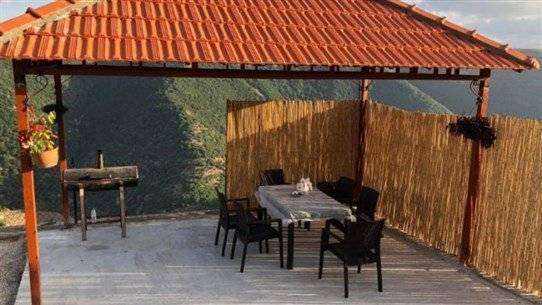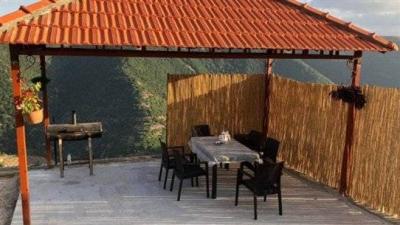Despite the severe economic collapse the country is experiencing, some have decided to invest within it and enhance domestic tourism, which has notably become active these days. It is the era of chalets that have spread like mushrooms in the villages of the south, each with a different character, some choosing a traditional style while others opt for a modern one. In the end, chalets have entered the profitable tourism investment line, each with its own identity and cost. The Chalets of Houmin Al-Fawqa are among the most expensive, generating significant buzz due to their daily rate set at $350, a price their owner considers normal compared to the services offered inside. However, there are chalets that chose to enter the tourism competition, all "fully booked," with costs not exceeding $120; their owners opted to enter this field as a means of creating job opportunities to withstand the crisis.
Reihana Hussein and Osama Qubaisi are two women who decided to venture into the chalet experience as an internal tourism investment, one deep in the tourist plain of Midenna filled with chalets, and the other on the banks of the eastern Zawtar River. The chalet represents an economic opportunity for them and is the key to tourism today. Both emphasize the necessity of creating opportunities in Lebanon and assert that domestic tourism has notably surged this year, contributed to by expatriates, tourists, and even locals, serving as a sort of migration from crises to calmness and tranquility, even if just for a day or two.
Hundreds of tourist, heritage, and even ancient sites are scattered across the villages and towns of southern Lebanon, including castles, museums, and caves, yet what stands out this year is the activation of chalet tourism, which has started to expand in southern villages and towns, attracting visitors and highlighting the importance of creating job opportunities "out of nothing," instead of waiting for relief from a government that has never paid attention to domestic tourism. Nevertheless, this sector is booming strongly.
Nestled in a magnificent overlook is the Maghara Chalet, designed in an old heritage style, situated on a hill overlooking the Midenna plain and the green valley. Owner Reihana Hussein chose to make it different, understanding that tourism investment is an adventure. She asserts that it has become popular recently and is attracting the attention of locals and expatriates alike, without hiding that the chalet, given its uniqueness, has provided motivation for many to escape the burdens of living and economic stress to find solitude in nature. She emphasizes the importance of tourism investment in the country "to lift it again," noting that demand for renting the chalet is very high and is booked until September. She attributes this to people's need for both psychological and mental relaxation, plus the added value of its location within the Midenna plain.
Traditionally, the south—especially the Nabatiyeh region—was overlooked on the domestic tourism map, despite its rich abundance of tourist sites, as attention has always been on the mountain and coastal villages while the inland areas remained neglected in terms of tourism and development. However, some have decided to showcase tourism models from scratch, as Osama Ismail mentions, who, along with her sister, decided to establish a chalet on the banks of the eastern Zawtar River. Osama began from the harsh economic conditions, noting that a job no longer provides sustenance in Lebanon, and believes that creating job opportunities is essential. Her idea stemmed from the fact that the chalet overlooks the eastern Zawtar River, located in a prime spot amidst mountains, rivers, and nature—elements that attract tourists.
She is happy that the demand for the chalet is high, as people seek an escape to a different reality. A winding road leads you through the village of Zawtar Eastern, where the old stone houses accompany you toward the river, keeping the village's charm intact; the tight-knit houses and small shops provide a unique holiday experience for visitors. Towards the chalet are towering mountains and significant nature leading deep into the river, where Osama and her sister established the chalet as a way to bolster their economic stability while enhancing the tourist presence, as chalets are now favored destinations for families. According to Osama, expatriates are looking for a quiet place away from the noise.
It is indeed an era of migration to chalets, as the great demand for them confirms that people need rest, which has contributed to the spread of these homes. The arrival of expatriates has invigorated them, meaning the economic wheel of the villages is turning with fresh dollars.




